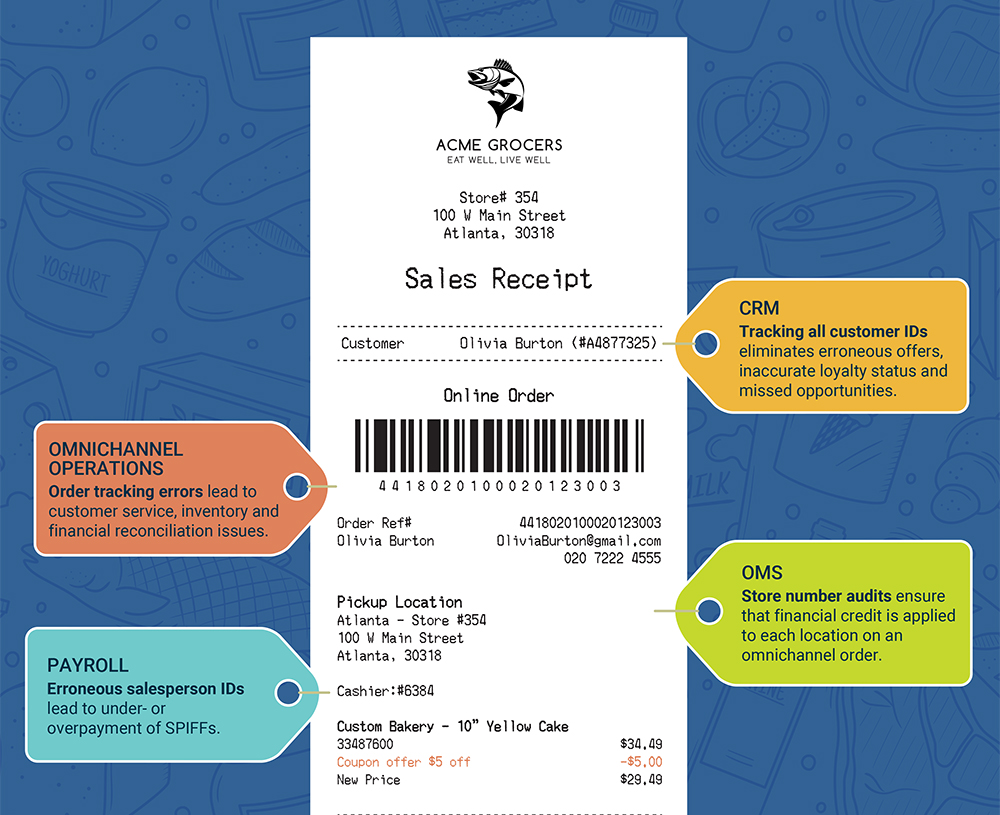
Vouchers gone wild: A real-world example of how Sales Audit could keep bad data from happening to good retailers
Despite advances in personalized recommendations, assortment planning and marketing outreach, coupons and discount vouchers remain a mainstay of retail strategies for driving traffic and increasing sales. And shoppers still love them. A recent study revealed that more than three out of five UK shoppers (62%) would consider switching supermarkets simply to redeem a coupon.
Unfortunately, sometimes shoppers can love their vouchers a little too much.
A stunning example of shoppers loving vouchers too much occurred earlier this year at Sainsbury’s, where shoppers discovered that a system error allowed an otherwise-innocuous £3.49 discount voucher offered through the Sainsbury’s app to be scanned multiple times at self-checkout registers. Not only did shoppers take advantage of the mistake to dramatically reduce the price of their own purchases, but many also took to social media to share the news with others. In a few cases, a few “enterprising” voucher lovers even sold their voucher codes to others looking to take advantage of the mistake.
As you might imagine, before long, Sainsbury’s stores across the UK were hit by shoppers looking to (fraudulently) scan — and scan, and scan again — their vouchers. And the losses quickly began to add up.
Once the error was discovered, Sainsbury ’s reacted with an expanded loss-prevention presence at self-checkout stands to help stem the tide of losses, but by the time they were able to rectify the situation, the damage had already been done.
Unfortunately, the voucher abuse incident that happened at Sainsbury’s is not an isolated one. Mistakes and errors like this happen every day in retail. And voucher mistakes are just one type of issue. Setup mistakes, reporting errors and interface issues in marketing, merchandising, inventory and store systems are all too common. They don’t all end up with such high-profile outcomes, but that doesn’t mean the mistakes aren’t happening and that the losses aren’t quietly adding up —often without the retailer’s knowledge.
That is exactly what we were referring to when we published an infographic focused on when bad data happens to good retailers.

Our hope when we created the infographic was to educate people on the risks that data errors at the point of sale can pose to decisions, actions and financial results across the entire extended enterprise. The infographic highlighted all the mistakes that could happen in just one transaction in one store on one register during the course of one day. We ended the infographic by asking readers to imagine the impact on their business if those mistakes were multiplied across all the registers in all their stores across many days. Well, thanks to social media, we don’t have to imagine anymore.

Customers taking advantage of one simple setup mistake cost Sainsbury’s thousands of pounds in stores across the country.
Little did we know when we created that infographic that it would be so on point with the Sainsbury’s incident … and honestly, as much as I am glad when our marketing hits the mark, I wish it had not been so “on the nose” this time. I hate that so many people took advantage of this mistake like they did, and I hate all the losses incurred by Sainsbury’s because of their actions.
But the broader point of our infographic (and this blog post) is this: these mistakes can be minimized — or, in many cases, avoided entirely — with a sales audit system. Modern sales audit tools, when properly configured, can identify and flag suspicious transactions as soon as POS data is processed (in many cases, as frequently as every 15 minutes). Alerts are immediately triggered, and the appropriate personnel can take swift action to update the vouchers and stop any abuse in its tracks.
RELATED: Why Sales Audit Matters to Grocers Podcast
Of course, having a cloud-based POS platform makes getting promo settings changed and transmitted to the stores as simple as flipping a switch. Moments later, the stores are updated and the losses are contained. Loss prevention tools, when integrated with your sales audit data, can help both investigate the problem and — more importantly — prevent the problem from spreading.
Aptos offers a sales audit solution, which is tightly integrated with our modern cloud POS platform. Aptos Sales Audit helps retailers make enterprise decisions with the most accurate, timely and verified POS data possible.
I hope consumers’ better selves prevail the next time a retailer makes a voucher mistake, but if that does not happen, here’s hoping that retailer will have the benefit of a modern sales audit system standing by to protect against significant losses.



